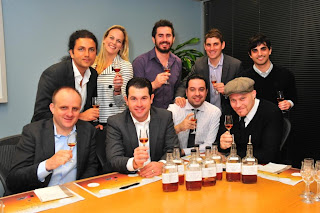 |
| Lorena Vasquez at Grandma's, Sydney |
A couple of weeks back I had the singular opportunity to interview a grande dame of the rum industry – one Ms. Lorena Vásquez – Master Blender for Ron Zacapa on her first visit to Australian shores.
Fellow Aussie booze Blogger Mr. Ben Shipley from
Everyday Drinking has covered in depth the highly complex ageing process for this famous rum. So I thought rather than cover this well trodden path with Lorena I would enjoy my deliciously fruity, sweet and complex Solera 23 rum and delve more into the curious nature of Zacapa’s use of sugar cane honey. Besides, despite the various Ron Zacapa tutorials I have attended I must admit the subject of solera ageing still gets me thoroughly confused especially after a couple of drams...
It must be said before we commence with the transcript, that Ms. Vasquez is charming, sharp of mind and incredibly passionate about her product. I daresay that even without the help of her translator I would have walked away from this interview inspired with a new love for Zacapa.
Lorena, how long have you been in the rum industry?
26 ½ years. It’s not that I’m old are but I started very young.
How many of those years have you being at Ron Zacapa?
I’ve been there all those years with them.
But what is it about rum in particular that attracted you to get involved in this industry?
I have always loved to perceive aromas and flavours. And within the rum industry, in particular with Zacapa rum, I have the opportunity to do that. To me more than a job it is a game.
What is your favourite aspect of your job at Zacapa?
What I like the most is to do the final blends. And the fact that I can discover how the rum develops. I can always find something in the glass of rum. One of the things I like the most about Zacapa rum is that it is not a boring rum. It is a rum that develops and allows you to talk to the rum to discover it.
Ron Zacapa is often credited with being the rum that gentrified the rum category. What is it about Zacapa that makes it so refined?
As far as I’m concerned it is the raw material that we utilise. Because we use the concentrated juice of the cane which is what we call the virgin sugar cane honey. We don’t use molasses. For us the raw material is as important as it is to a chef. Another very important aspect is the ageing where we use all the different casks. As I told you, because I don’t like boring things, what we look for in the rum is more complexity in aromas and flavours and foir more sophisticated. This allows you to enjoy and drink the rum without the need of mixing it. This has changed the perception of rum.
For me rum is about a moment of relaxation and pleasure. A good meal and a good drink; a good rum.
So you have just said that Zacapa is a rum that you can enjoy without mixing, but cocktails are without doubt incredibly popular. How does Zacapa lend itself to mixing?
For me the use of Zacapa rum in cocktails also allows you to raise the category of the cocktail. Because this rum has enough personality – even though it is mixed in a cocktail the rum still says I am here. Although I say that the Zacapa rum can be enjoyed without mixing it is the consumer who ultimately decides how they are going to enjoy the rum.
Specifically what difference does the use of the virgin sugar cane honey make to the final product as oppose to using molasses?
The virgin sugar cane honey – in order to produce it you cut the sugar cane then we press it to take the juice out then by using heat we evaporate the water out of it to concentrate the sugars. The sugars in the virgin sugar cane honey are the same sugars that are in the sugar cane plant because we haven’t extracted anything. Molasses on the other hand is a sub product of sugar production. Therefore when they are producing sugar they are extracting sucrose, sucrose and more sucrose. In the end the chemical composition of the molasses is totally different from the composition of the virgin sugar cane honey. This is important because in the process the compounds are going to be formed which depend on the chemical composition of the raw material. The aromas and flavours that are formed in the fermentation of the virgin sugar cane honey are different than when using molasses.
When using sugar cane honey the resultant rum is sweeter and more fruity with flavours like banana, pineapple, cinnamon, cloves and ginger. When the molasses is fermented what you get is drier and stronger, rougher.
How long does the fermentation process take for Zacapa?
We have a fermentation that lasts for more than 100 hours. Because, and this is very important because when you produce a vodka you are not interested in aromas and flavours just the ethyl-alcohol. So the fermentation is done very quickly 18 to 20 hours. For Ron Zacapa we’re interested in the many flavours and aromas that can be developed during fermentation. That’s why we do a slower fermentation so that the yeast is enough time to consume all the sugars from the virgin sugar cane honey and produce all the other compounds which are the ones which give us all those aromas.
Tell us about the yeast you use at Ron Zacapa?
Every time we ferment a new batch of Zacapa rum we use fresh yeast. This is very important for the cleanliness of the aromas and flavours.
And is the strain you use one you have isolated?
Yes. Our saccharomyces cerevisiae comes from the pineapple and is our own. In fermentation it is very important, how can I put it… to have a relationship between the yeast and the raw material that we are using. And this yeast works very well with the virgin sugar cane honey. The reason being that fermenting the sugar cane honey is different than working with molasses.
Has Ron Zacapa changed over the years you have been there?
In terms of the production method we have always made the rum in the same way. But I always say that the process of making a rum is alive. The production of the sugar cane is affected by climate change, for example. In the fermentation process the yeast is alive, in the ageing I say that the casks are alive because each barrel is going to give you different aromas and different flavours.
Production methods aside, obviously the company has grown, so how have you managed to maintain the standards of Zacapa with the company growing?
We have been increasing the amount of rum produced and the amount we age for a number of years. And we have control of what can be produced each year. What can be produced in a particular year is that quantity and it cannot be exceeded. We plan each year for growth, but it is a small growth it will never be a massive product.
Are there other rum producers that you respect and admire?
I think the world of rum is like the world of cooking each producer has his own unique style and each producer makes the biggest effort he can within his rum’s style to make the best rum.
Fantastic a very politic answer! What else apart from rum do you enjoy drinking?
I like red wine. I like a red wines are the complex. I don’t like anything that is flat.
Is there much of a red wine industry in Guatemala?
No. All the wine in Guatemala is imported. I do really like wines from Mendoza like Malbec.
What I your typical duties at Zacapa?
To evaluate the different rums. [In English] Tasting and tasting! And to do some administrative control work.
What do you love most about being in this industry?
To put in time, patience, and devotion into a rum that many other people in the world are going to enjoy.
What would you change about this industry if anything?
I think in the world of rum all producers should work together to raise the level of rum.
If you could share a Ron Zacapa with anyone dead or alive who would it be and why?
A tough one. I can’t come up with one name but whenever I have a Ron Zacapa I hope to share it with someone who can talk about many different and interesting subjects.








































